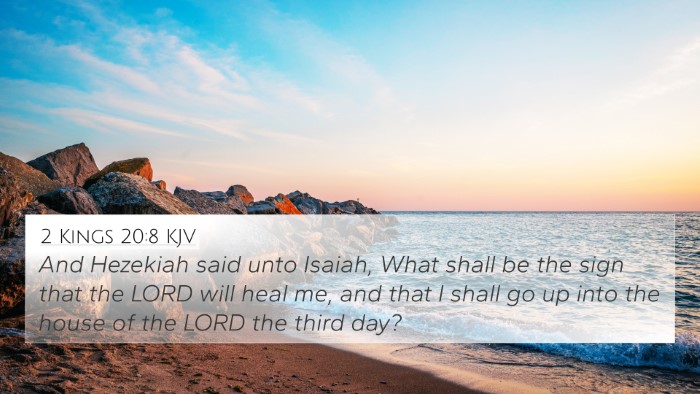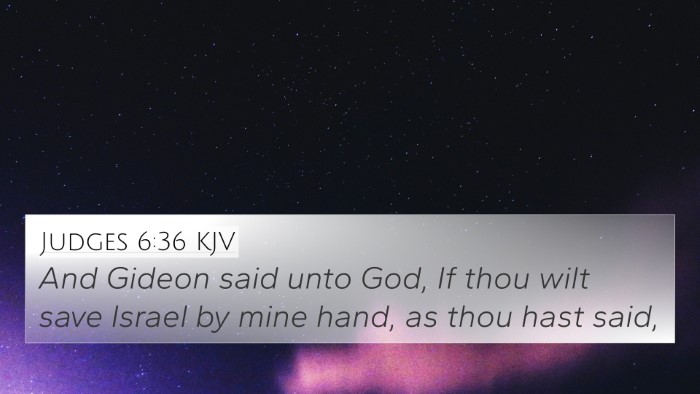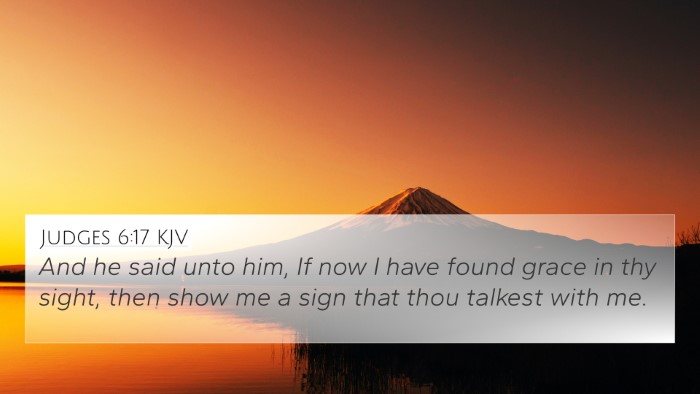Understanding Genesis 15:8
Genesis 15:8 presents a pivotal moment in Scripture where Abram questions God about how he will know that he will possess the land promised to him. This verse captures a significant dialogue between humanity and the Divine, reflecting a deep-seated yearning for assurance and understanding of God's promises.
Verse Context
In Genesis 15:8, Abram states:
“And he said, Lord God, whereby shall I know that I shall inherit it?”
This moment is part of a broader narrative where God establishes His covenant with Abram, affirming the promise of land and descendants. Abram's question reflects the human condition—a desire for reassurance in the face of uncertainty.
Commentary Insights
Insights from various public domain commentaries provide a richer understanding of this verse:
- Matthew Henry: Henry emphasizes that Abram's question arises from a place of faith; he seeks not to doubt God's ability but seeks the reassurance that God will fulfill His promise. It illustrates how God often invites questions from His people, fostering a dialogue that strengthens faith.
- Albert Barnes: Barnes notes that this inquiry is typical of human nature. He explains that Abram’s asking for a sign reveals the intersection of faith and doubt. Despite Abram's faith, there is an underlying desire for tangible proof of God's promises. This reflects the essential nature of faith—believing in the unseen while yearning for affirmation.
- Adam Clarke: Clarke addresses the significance of God providing evidence of His covenant. He suggests that this moment was crucial for Abram's understanding and for future generations to reflect on how God responds to His people’s inquiries. This sets a precedent for seeking God’s confirmation of His promises throughout Scripture.
Thematic Connections
This verse offers rich thematic connections within the Bible, often relating to faith, covenant, and assurance. Some of these connections include:
- Covenant Assurance: Genesis 12:1-3, where the initial promise is made to Abram.
- Faith in God's Promises: Hebrews 11:8-10, which reflects on Abram’s faith journey.
- The Nature of Human Doubt: Psalm 77:7-9, where the psalmist questions God in times of trouble.
- God's Faithfulness: Romans 4:20-21, where Paul's commentary on Abraham emphasizes faith without wavering.
- Signs of God’s Covenant: Luke 1:70-75, which reflects God’s fulfillment of promises through Jesus Christ.
- Assurance of God’s Presence: Matthew 28:20, where Jesus promises His presence to His followers.
- The Role of Signs and Wonders: Exodus 13:14, where God reassures the Israelites through the Passover and signs.
Cross-Referencing Biblical Texts
Genesis 15:8 can be linked to various scriptures that reinforce its themes. Below are notable cross-references:
- Genesis 12:1: The foundation of God's promise to Abram.
- Genesis 15:6: Abram believes the Lord, which underscores the nature of faith associated with his inquiry.
- Hebrews 6:17-18: God’s unchanging character as assurance for His promises.
- Isaiah 41:10: A source of comfort which mirrors the assurance sought in Genesis 15:8.
- Joshua 21:45: Confirmation that God's promises ultimately come to fruition.
- 2 Corinthians 1:20: Affirmation that all God’s promises in Christ are “Yes” and “Amen.”
- 1 Thessalonians 4:14: Hope in resurrection connects with the assurance in God's covenant.
Interpretative Insights
This verse serves as a reminder of the importance of seeking understanding and assurance from God regarding His promises. The inquiry by Abram is not a sign of weak faith, but rather an earnest pursuit of knowledge about God's plans. Here are some key insights regarding the interpretations of this verse:
- It presents an opportunity for individuals to openly communicate their doubts and questions to God.
- It signifies that God welcomes inquiries about His promises and encourages believers to seek assurance.
- Abram's question highlights the relationship between faith and the necessity for signs that ground that faith.
- This encounter demonstrates that God is not distant but engages actively in a relationship with His people.
- Believers today can utilize this example to guide their prayers and supplications for understanding of God's will.
- The verse sets a precedent for committing one's anxieties and questions to God who is open to dialogue.
Application for Today
Applying the truths from Genesis 15:8 encourages believers to communicate with God honestly. It challenges individuals to explore their faith struggles while seeking divine assurance. Here are practical applications:
- Engage in prayerful conversations similar to Abram's, asking God for clarity and understanding.
- Utilize cross-references and Bible study tools to deepen understanding of God's promises.
- Create a personal study plan that incorporates comparative Bible verse analysis to connect old and new themes in Scripture.
- Reflect on promises in your life and how they align with biblical assurances, using cross-referencing to reinforce faith.
- Share insights and questions with fellow believers to foster community discussions about faith and God's promises.
Conclusion
Genesis 15:8 encapsulates a fundamental relationship dynamic between humanity and God. Abram's heartfelt inquiry serves as a model for how believers can approach God with their uncertainties while seeking His promises and assurances. Through understanding and studying this verse in conjunction with related scriptures, believers can deepen their faith, solidifying their trust in God's unfailing commitments.












